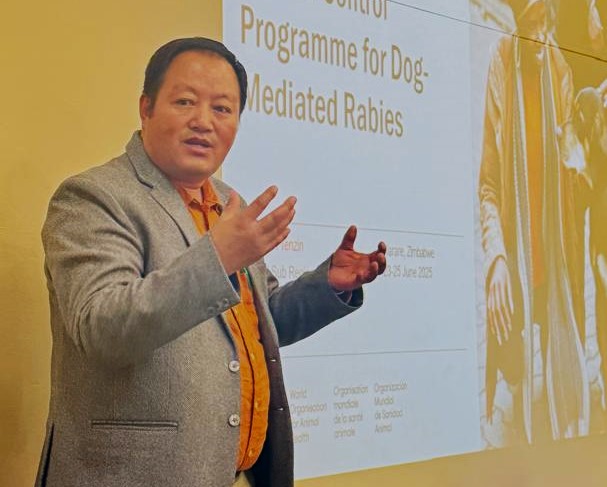
Mozambique has taken a significant step toward eliminating dog-mediated rabies with the successful completion of a three-day National Stakeholder Workshop aimed at developing a revised National Strategic Plan (NSP) for rabies control. Held from 29–31 October 2025 at the VIP Grand Hotel in Maputo, the workshop brought together 25 technical experts from across sectors, including veterinary services, public health, wildlife, education, municipal authorities, and academia. The event marked a pivotal moment in Mozambique’s commitment to the global goal of eliminating dog-mediated human rabies deaths by 2030.
The World Organisation for Animal Health (WOAH) Sub-Regional Representation for Southern Africa, based in Gaborone, Botswana provided technical and financial support.
Dr. Tenzin Tenzin from WOAH attended the workshop and delivered three technical presentations during the workshop. He emphasised the importance of a robust NSP and highlighted international tools and resources available to support rabies elimination. His presentations covered the Global Strategy – “Zero by 30”, the Stepwise Approach towards Rabies Elimination (SARE), the UAR Forum, and successful case studies such as Namibia’s rabies control programme. He also introduced WOAH’s rabies Vaccine Bank, the WOAH programme for the Endorsement of official control for dog-mediated rabies control and encourage Mozambique to submit an application for WOAH endorsement. WOAH’s support has been instrumental in Mozambique’s rabies control efforts.
In addition to facilitating the workshop, WOAH donated 100,000 doses of rabies vaccine on 7 October 2025, building on a previous donation of 50,000 doses in 2022. These vaccines are critical for implementing mass dog vaccination campaigns, a cornerstone of rabies prevention. WOAH and GARC also provided technical assistance for the use of a mobile application to manage vaccination campaign data, enhancing real-time monitoring and reporting.
Stakeholders at the meeting also presented the rabies situation and control in Mozambique. Rabies is endemic in Mozambique and human dog bite cases and rabies-related deaths remain alarmingly high, with an average of 22,000 bite incidents and approximately 20-30 human rabies deaths reported annually.
Participants reviewed the country’s previous rabies NSP, which expired in December 2019, and began drafting a revised plan that aligns with international standards and the “Zero by 30” global strategic framework. The updated NSP will serve as a roadmap to guide national efforts in key areas such as:
The multisectoral team expressed strong commitment to finalizing and implementing the revised NSP. Stakeholders acknowledged the vital role of international collaboration and thanked WOAH for its continued support. Mozambique now looks forward to operationalizing the new strategy and accelerating progress toward a rabies-free future.
The revised NSP is expected to be finalized and endorsed in the coming months, setting the stage for coordinated, evidence-based action to protect both human and animal health across Mozambique.


